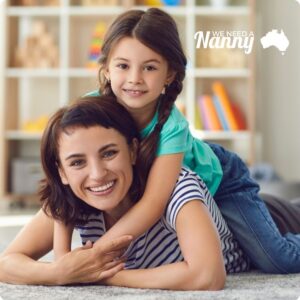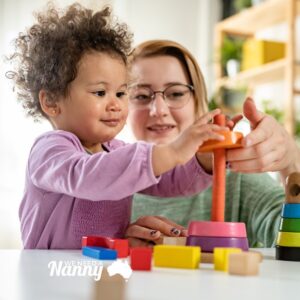It’s not only children and teens who benefit from positive parenting. It also makes family life more enjoyable, easier, and more rewarding for parents.
More and more parents understand that it’s okay to ask for help. Did you know that in Queensland, positive parenting support is free for any parent or caregiver of a child up to 16 years old? Positive Parenting programs accommodate the child’s age group, special requirements, and family lifestyle. Thus, there is a more personalised program for every family.
What is Triple P – Positive Parenting Program?
The Triple P Parenting Program, or Positive Parenting Program (PPP) is a family support system to help children reach their full potential.
The abbreviation PPP refers to the Positive Parenting Program. It uses positive parenting methods that show warmth, love, and compassion to children. It encourages children and builds them up using a powerful message: You are loved, you are good, you are important.
Triple P is meticulously designed to assist parents in their journey. It provides help and guidance for different families when in their own time of need.
The Program aims at creating a more supportive environment for parents. It also helps to treat and manage behavioural and emotional issues in children and teenagers.
Who can benefit from Positive Parenting?
Everyone involved in a child’s life affects their physiological and physical upbringing.
So, the benefits of Positive Parenting can include anyone from the following:
- Caregivers or nannies
- Biological parents whether single or both parents.
- Adoptive or foster parents.
- Other relatives such as grandparents, aunts, uncles, or cousins.
- Older Siblings.
- Non-relatives or friends.
Parenting research and methods are luckily no longer based on a deficit or risk factor model. Implying that a parent’s skills and knowledge are deficient, in the deficit model. Similarly, risk factors such as stress, violence, poverty, etc., cause parental dysfunction.
Positive Parenting typifies this outdated approach. It does so by promoting parental behaviour essential for positive development.
Several researchers propose definitions of positive parenting using hundreds of pertinent articles. The conclusion is: “Positive Parenting is a continual relationship between parents and children. It includes caring, teaching, leading, and communicating. As well as providing for a child’s needs unconditionally and consistently”
How Does the PPP Parenting Program Work
The triple P positive Parenting program implements practical strategies for parents. These strategies confidently manage behaviour problems in children. It will equip parents and families to use skills developed to manage family issues.
The program gives parents simple tools to improve parenting methods. The design of the program addresses families and children in the community with various needs.
The program supports parents of children from ages 0-16, through a range of courses :
- Triple P for children up to 12 years old.
- Teen Triple P for children between 12 and 16, or teenagers.
- Triple P for Baby helps parents with infants.
- Stepping Stones is a program for parents with disabled children.
- Family Transitions is a program for divorced parents, or parents going through separation.is a
- Lifestyle program for parents with overweight children.is a specialist program delivered to parents of children who are overweight
- Indigenous parents course, for indigenous parents with a more traditional parenting style.
- Fear-Less Triple P for parents with anxious children who lack emotional resilience.
The program caters to different community and family beliefs. It addresses topics such as child maltreatment, mental health conditions, disabilities, and behavioural complications.
Parenting skills show an increase in effectiveness. Similarly, more positive relationships become established between children and families.
What is the Purpose of Triple P – Positive Parenting Program
Effectively not only children and parents benefit from positive parenting. Essentially, it’s not only children and teens who benefit from positive parenting. It also makes family life more enjoyable, easier, and more rewarding for parents.
Positive parenting support is available for every family or caretaker of a child. There are support groups and institutions that provide free courses and support for parents and caregivers.
Did you know that the Triple P – Positive Parenting Program was developed right here in Queensland? It is a popular program used all over the world by many parents.
Most individuals strive to be exceptional parents. However, the challenges of parenthood are endless. This can leave many parents feeling hopeless and frustrated. Challenges are evident across children of all development stages, toddlers, and teenagers alike. Though it is comforting to know there is help and support to raise happy and healthy children.
The good news is that there is a vast amount of research tools, courses, programs, information, and support tools available for parents today.
All these resources provide a wealth of information. Information regarding positive and more effective parenting methods. The information teaches effective skills for parents to implement. parents use the skills in various scenarios of their child’s development.
Common parenting challenges are easily addressed.
You can use Positive Parenting methods in all these scenarios and more:
- Bedtime or sleep issues.
- Eating disorders and Picky eating.
- Tantrums and behavioural issues.
- Aggression in Children.
- Anxiety and social shyness.
- Starting School.
- Mutual respect.
- Making Friends.
- Responsibility and Problem Solving.
Because the programs are so personalised they effectively work for each situation and family.
Why Do Parents Love Triple P
There are so many positive reviews from parents on the parenting program. One of the factors parents find most helpful is how versatile and diverse the program is. There are a variety of Triple P programs available that are easily tailored to meet the parent’s needs and the community they are in.
A few reasons why parents love the program are:
- Because most courses offer individual sessions.
- It includes limits and established routines that are highly effective.
- It encourages parents to teach Pro-Social skills and altruism.
- It equips parents and children to confidently deal with challenges.
- It teaches parents on how to easily balance work, and family life with less stress.
- The results are a happy, healthy, and supportive family.
- Triple P offers practical skills and tools to help parents.
What Does Positive Parenting Involve
Positive Parenting is a nurturing and empowering parenting method that guides and sets boundaries. It results in the full development of the child.
Combining all the definitions and most of the literature on positive parenting, the spectrum involves the following:
- Guiding Children and parents towards more effective parenting and developmental methods.
- Leading and leadership traits.
- Teaching children and parents.
- Empowering children and parents in a nurturing way.
- It is sensitive to both the parent’s and child’s needs.
- It teaches consistency in all aspects.
- It teaches you to set boundaries and is always non-violent.
- It encourages Regular Open Communication.
- It focuses on emotional security, warmth, affection, and unconditional love.
- It teaches parents to recognise the positive and rewards accomplishments.
- Children’s developmental stages are taken into consideration and respected.
- Empathy is one of their biggest cornerstones, always considering a child’s feelings.
They are taking all these factors into consideration, in the words of Debbie Godfrey a certified parent educator. The underlying assumption is that “all children are born good, are altruistic, and desire to do the right thing”.
Furthermore, she implies that parents should teach discipline in a way that builds a child’s self-esteem and does not break their spirit.
How Triple P Can Help
As a parent or caregiver, you might wonder how all of this can help you.
Triple P helps you to achieve parenting goals in a more supportive way. It focuses on building a child’s emotional and mental self-esteem.
It will help your children thrive and be able to handle everyday challenges.
The Power of Positive Parenting
Positive parenting is empowering and encouraging for both parent and child. It motivates good behaviour and develops social skills in children, setting them up for success.
- Positive parenting helps children to achieve better in school.
- Children have fewer behavioural problems and stronger mental health.
- Positive parenting contributes to better emotional and cognitive functioning in the teenage brain.
- The long-term benefits include better relationships and mental, and physical health.
- Children raised with this method have a happier and healthier adulthood and healthy relationships.
How do You Apply PRIDE Skills as Part of Positive Parenting
There are five ways in which you can start to apply positive parenting. They are called PRIDE Skills. PRIDE skills are 5 methods included in the positive parenting program that you can easily use in everyday life.
You can easily adapt these skills to suit your unique family and needs.
What are the Benefits of PRIDE Skills
However, let’s first look at some of the benefits of using PRIDE skills as part of the Triple P program.
The five skills are an excellent foundation to teach social skills and prepare children for school. It also helps to teach children to manage their behaviour and emotions on their own.
PRIDE Skills teaches children good behaviour that increases with PRAISE, one of the five methods.
You will notice the development of the following skills in your Children:
1. Self-Control
Children will be much gentler and calmer when expressing their feelings and views. Safety becomes a priority. They will also learn patience.
Social Skills and Good Manners
Children will learn to be kind, compromising, and helpful. They will be a good sport rather than a sore loser. Sharing, showing empathy, and using good language, with proper eye contact will develop as social skills. Manners such as saying please and thank you will come naturally.
2. Improvement in School and Academics
The method encourages flexible and creative thinking, essentially thinking things through. Thus, children become more focused on tasks, persistent, and hard-working. They can work independently and easily solve problems.
3. Active Listening and Obedience
You will be surprised that they accept “no” for an answer, do things right away, follow directions, and comply. Listening improves and you will not have to ask for things more than once. Similarly, they will start asking for permission, rather than just taking what they want.
The 5 PRIDE Skills for Parents and Children
Now that that’s covered, you most likely cannot wait to start using these miracle skills. To be honest, they are just well-researched skills, proven by experts because of their effectiveness. Though what works for one parent may not work for the other, PRIDE skills are adaptable.
The 5 Pride Skills were originally developed as part of the Parent-Child Interaction Therapy (PCIT) intervention. An intervention developed by Sheila Eyberg. She is a university professor at the University of Florida and the president of PCIT International. Sheila is also part of the Department of Clinical Health and Psychology.
Thus, quoting from the Parent-child interaction therapy (PCIT) intervention, here are the original 5 PRIDE Skills:
- “Praise” – Love what they do
- “Reflect” – Say what they say.
- “Imitate” – Do What they do
- “Describe” – Say what they do.
- “Enjoy” – Show warmth and enthusiasm.
Praise
Praise is a method of positive reinforcement. The method mainly uses positive statements to convey support. Keep in mind things that you say to children, eventually become their inner voice. The inner voice of support can build them up or tear them down. This is especially true in younger children. Everything you say to them eventually sticks, and remains during their life.
Praise is a form of positive communication to promote the child’s social, and problem-solving skills.
Similarly positive communication helps to enhance relationships between children and parents, caregivers, or friends. Using a more optimistic method of parenting you will support and encourage your children to believe in themselves.
Toddlers and younger children may attempt to feed and dress themselves. Older children will attempt more difficult challenges. In both these cases it is vital to ensure their attempts are great, even if not 100% correct.
This technique teaches them to find Pride in what they do, and themselves, and to rely less on external approval.
You can encourage children to set more achievable goals for themselves at any age.
Similarly, the Triple Teen course encourages parents to respect the opinions of their teenagers. Consider what they are feeling and try rather to understand their thought processes. It is vital for a teenager to feel heard and always understood.
Praise focuses on hard work and effort, rather than whether the result was correct or successful. Keep in mind always to respect that your children need to feel independent. Just as adults need privacy and personal space, teenagers especially, and even young children, need space and privacy from time to time.
Reflection
In reflection, we deal with positive psychology as a parenting approach. Positive Psychology focuses more on nurturing and good behaviour than addressing bad behaviour. One of the main steps of reflection is being responsive to your children.
In the dictionary, the definition of responsiveness is to react quickly, and positively. When you respond to a child timeously with positive words or actions, they feel appreciated and encouraged.
Look at babies for instance. They cry when they have a basic need, or an emotional need, such as food, or comfort. Now there is much controversy about allowing babies to self-soothe. However, think about it this way. When your baby cries simply to be held or soothed and you ignore it and let them cry it out, what happens?
With this process continuing the baby will eventually learn that nobody is coming, and their feelings do not count. Thus, they do not self-soothe but rather accept in essence, abandonment. This will not raise a very healthy or encouraged child, but rather an emotionally distant child.
Children from birth need parents to spend time with them. Parents guide children through problem-solving and help them when they are upset.
As they grow older the conversations will change, and their need for help will lessen. However, it is advisable to keep an open communication. Talk to teenagers and children about their friends, their goals, and accomplishments.
Especially with older teens, it is vital to respond to their concerns and to check for any changes in their behaviour.
Imitating
Many parents like to imitate babies, their noises, and facial expressions as a form of play. This may seem quite insignificant; however, Imitation can be exceptionally flattering to a child.
Imitating your child sends a message that you show interest in them, what they like, and that they are important.
On the other hand, when an adult imitates the child, the child is more likely to follow their example and imitate the adult. Part of parenting is to be a role model to your children. What better way to implement this than to imitate your child as a role model, so they return the favour?
Similarly, imitation is a good way to encourage social exchange development in younger children.
Parents should adopt a parenting style characterised by teaching, encouragement, affection, and nurturing. The parenting style includes so many positive outcomes.
Some of these include:
- Children that have an increased compliance.
- Children who are better equipped to start school.
- Better social and cognitive development.
- Less negative behaviour and antisocial behaviour.
You can even start with your toddler and join them in pretend play. Play along with them, and teach by shifting inappropriate actions to more appropriate actions.
Try to support older children taking on new challenges, and suggest a few problem-solving ideas when problems arise.
Description
Description in the PRIDE skills is all about setting healthy boundaries for children.
Setting clear boundaries is vital. Make sure that your expectations are achievable, valid, and clear, without being pushy. The action and reaction method after disrupting boundaries is an excellent way to reinforce them. It enforces how important rules are because there is a consequence to every action.
You can show that following rules will lead to a positive outcome. Whereas not following them results in negative consequences.
Describing boundaries and rules to children ensures that you have their attention and that you show interest in them. It also helps to build strong self-esteem in children. It helps to prevent problems developing from misunderstandings. caregiver
Present your boundaries and rules in a positive way. Teach them that boundaries show responsibility and accountability.
Showing, or describing a line of consequences ahead of time, helps show children how important it is to follow rules.
Going back, when a child follows the rules or instructions, always give good Praise..
Even if your child crosses a boundary, try to praise them for how they reacted, or their attitude. For example, if they crossed a boundary, and admitted it, or apologised. Give praise for the apology, and encourage them to keep boundaries.
In a conflict situation with older children, always be clear of goals and expectations. Show them due respect, however, hold your authority and listen to their inputs and how they feel about a goal or expectation.
Enjoyment
Last, and on the lighter side is Enjoyment. Taking time to play, forgetting about the hustle and bustle of life for a while.
Playtime is essential when raising a child, especially for teenagers. Distraction-free playtime allows the parent and child to relax, pause, breathe, and form a closer bond.
Essentially enjoyment means radiating positivity and warmth using words and actions.
You can express enjoyment during play in these simple ways:
- Always make eye contact when speaking to a child.
- Shower children with hugs and kisses.
- Keep a bright and warm smile.
Enjoyment interventions, along with positive parenting techniques have so many positive parenting outcomes:
- It improves attachment security.
- Children more easily adjust to school environments.
- It decreases family stress and conflict.
- It improves family and community communication.
- Optimistic development increases.
- Children will learn to understand and regulate their own emotions increasing optimistic development.
Any example in which the parent shows excitement can help kids to understand and regulate their own emotions.
A Few More Positive Parenting Tips
Parents with a warm and loving nature support and nurture their children. In turn, this raises the child’s spirit. It empowers their intellect and provides them with tools to deal with obstacles easily.
TIP 1: Play with PRIDE skills
The more PRIDE skills you can use, the better the outcome. Use PRIDE skills to improve Playtime, and make it magical.
TIP 2: Give Your Child the Lead
Children rarely get the opportunity to lead. Thus, if possible, allow them to lead. Especially during playtime, let your child choose what to play and how to play. Try to reduce commands and rather turn them into questions, such as “Did You Know…”
In Conclusion
To summarise PRIDE Skills and Triple P Parenting. It is a parenting skill to use to reduce bad behaviour and encourage good behaviour. The program encourages parents to be on the lookout for any good behaviour or intent and give praise.
How do I Get More Information on Triple P Parenting
If you would like to take some of the courses, you could find a free seminar in your area, or use online resources. Courses are available on the Triple P Parenting website.
What support is available for parents?
You can use Trip P at any stage of your child’s life. It is never too late, or too early to start. There is a range of online seminars, group workshops, and one-on-one consultations available. It is your choice how much, or how little help you need. The course can be adapted to your individual preference and situation.
Triple P Online for Baby
Triple P Online under 12
Fear-Less Triple P Online
Family Transitions Triple P Online
Teen Triple P Online
There is an online manual that provides you with everything that the program has to offer. Ideally, the manual also contains a summary of the entire program and how you can implement it as needed.
Boost your child’s self-esteem by using Praise. Always choose your words carefully, and compliment the good rather than criticise the bad.
Catch good behaviour fast, and encourage it. Rather than always finding fault, look past faults and rather complement good behaviours.
Set achievable boundaries and limits, and always be consistent with them. Establish a disciplined routine with acceptable consequences if they happen to break the rules.
Make time for your children, such as a family meal, or playtime.
Always be a good role model. Keep in mind children do what they see, and not always what they are told.
Communicate with your children. Explain your goals and expectations. You cannot always expect a child to do something simply because you said so.
Keep your expectations realistic and age-appropriate. For example, rather than saying “no” to your toddler touching things, relocate the items out of reach. You will have to change your parenting style as your child ages gradually. Always provide good guidance and encouragement.
Show unconditional love. Correcting and guiding children is not the problem, it is the way that you do it. Try to nurture and encourage, rather than blaming and scolding children.
Keep your own needs and limitations in mind. No parent is perfect, so recognise your abilities as a parent and have realistic expectations for yourself.










